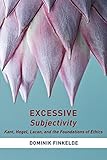Excessive Subjectivity : Kant, Hegel, Lacan, and the foundations of ethics / Dominik Finkelde ; translated by Deva Kemmis and Astrid Weigert.
Material type: TextLanguage: English Original language: German Series: Publication details: New York : Columbia University Press, (c)2017.Description: 1 online resource (xv, 340 pages)Content type:
TextLanguage: English Original language: German Series: Publication details: New York : Columbia University Press, (c)2017.Description: 1 online resource (xv, 340 pages)Content type: - text
- computer
- online resource
- 9780231545778
- BJ1114 .E934 2017
- COPYRIGHT NOT covered - Click this link to request copyright permission: https://lib.ciu.edu/copyright-request-form
| Item type | Current library | Collection | Call number | URL | Status | Date due | Barcode | |
|---|---|---|---|---|---|---|---|---|
 Online Book (LOGIN USING YOUR MY CIU LOGIN AND PASSWORD)
Online Book (LOGIN USING YOUR MY CIU LOGIN AND PASSWORD)
|
G. Allen Fleece Library ONLINE | Non-fiction | BJ1114 (Browse shelf(Opens below)) | Link to resource | Available | ocn995484966 |
COPYRIGHT NOT covered - Click this link to request copyright permission:
https://lib.ciu.edu/copyright-request-form
Includes bibliographies and index.
Introduction: On the necessity of the deed -- Excessive subjectivity and the paradox of autonomy as its prerequisite -- Kant: the split subject of ethical agency -- Hegel: the split ethical life and the subject -- Lacan: subjectivity and the autonominal force of lawgiving.
How are we to conceive of acts that suddenly expose the injustice of the prevailing order? These acts challenge long-standing hidden or silently tolerated injustices, but as they are unsupported by existing ethical rules they pose a drastic challenge to dominant norms. In Excessive Subjectivity, Dominik Finkelde rereads the tradition of German idealism and finds in it the potential for transformative acts that are capable of revolutionizing the social order. Finkelde's discussion of the meaning and structure of the ethical act meticulously engages thinkers typically treated as opposed--Kant, Hegel, and Lacan--to develop the concept of excessive subjectivity, which is characterized by nonconformist acts that reshape the contours of ethical life. For Kant, the subject is defined by the ethical acts she performs. Hegel interprets Kant's categorical imperative as the ability of an individual's conscience to exceed the existing state of affairs. Lacan emphasizes the transgressive force of unconscious desire on the ethical agent. Through these thinkers Finkelde develops a radical ethics for contemporary times. Integrating perspectives from both analytical and continental philosophy, Excessive Subjectivity is a distinctive contribution to our understanding of the ethical subject. --
There are no comments on this title.
